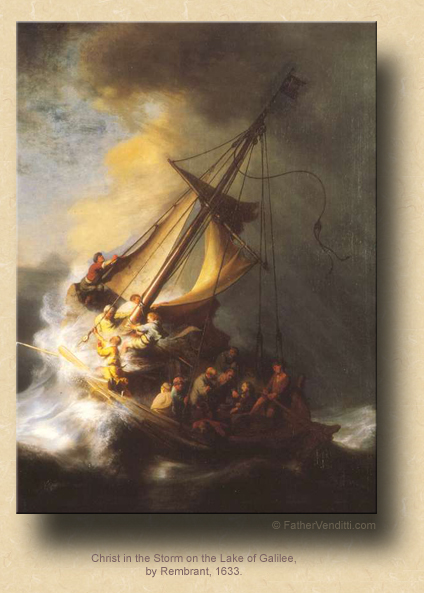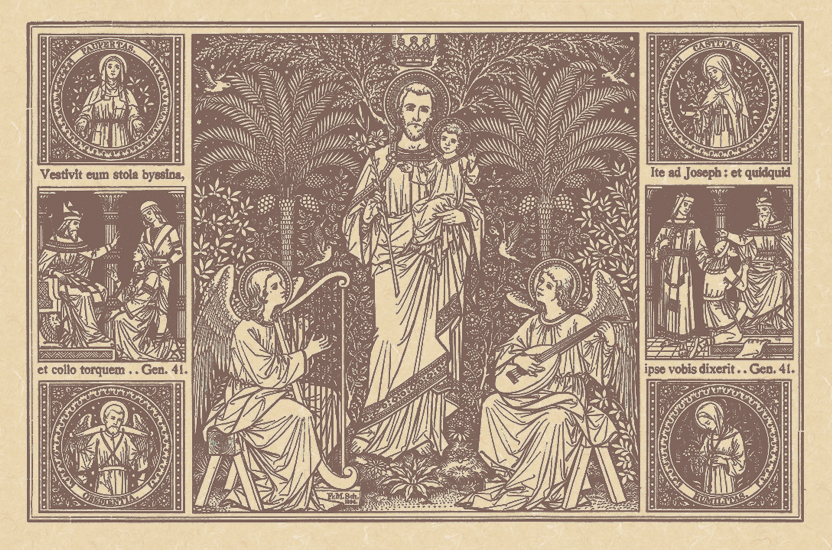Elementary, My Dear Watson.
The Twelfth Sunday of Ordinary Time.
Lessons from the secondary dominica, according to the ordinary form of the Roman Rite:
• Job 38: 1, 8-11.
• Psalm 107: 23-26, 28-31.
• II Corinthians 5: 14-17.
• Mark 4: 35-41.
The Fourth Sunday after Pentecost.
Lessons from the dominica, according to the extraordinary form of the Roman Rite:
• Romans 8: 18-23.
• Psalm 78: 9-10.
• Luke 5: 1-11.
The Fourth Sunday after Pentecost; and, the Feast of the Holy Martyr Julian of Tarsus.
Lessons from the pentecostarion, according to the Ruthenian recension of the Byzantine Rite:
• Romans 6: 18-23.
• Matthew 8: 5-13.
The Secular Observance of Fathers' Day.
FatherVenditti.com
|
 8:31 AM 6/21/2015 — A happy Fathers' Day to all the fathers present here with us today. Though the Holy Mass today follows the liturgy as prescribed by the Missal, I encourage all of you to remember your fathers, both living and deceased, in today's Mass; and, I will be inviting all the fathers here to receive a special blessing at the end of today's Mass. 8:31 AM 6/21/2015 — A happy Fathers' Day to all the fathers present here with us today. Though the Holy Mass today follows the liturgy as prescribed by the Missal, I encourage all of you to remember your fathers, both living and deceased, in today's Mass; and, I will be inviting all the fathers here to receive a special blessing at the end of today's Mass.
Because Father Paul and I are not parish priests, we have very few occasions to receive visitors at the chaplaincy, and tend to discourage it; but, the few of you who have been there and been in my sitting room will no doubt remember my pipe rack containing all my Sherlock Holmes memorabilia. I read all of Arthur Conan Doyle's stories growing up; and, whenever there’s a new dramatization of one on TV or the movies, I always see it.
When I was sick and had to spend a month confined to my rectory recovering from surgery, I took it upon myself to start writing a book of my own: a life of Sir Arthur Conan Doyle combined with a review of all sixty of his Sherlock Holmes adventures. This, of course, necessitated re-reading them all; and, as I did so, I began to see them with a more critical eye, and realized that Sherlock Holmes wasn’t as smart as I originally thought he was. After all, it’s no trick for a mystery writer like Doyle to make his detective seem brilliant when he’s made every other character in the story an idiot. Holmes always solves the case, but he does so amid an entourage of bumbling policemen and his own friend and biographer, Watson, who can’t seem to see the fog for the weather.
And it occurs to me that I get that same feeling whenever I read this passage about our Lord calming the sea. They’re all amazed at this feat; and it’s almost as if, up to this point, our Lord has given his disciples no indication that He is in any way Divine. Except that just prior to this—assuming we accept Saint Mark's chronology of the life of our Lord—Jesus has already cured Peter's mother-in-law, He's cleansed a leper, He's healed the paralytic who was lowered down through the roof, He cured the man with the withered hand. You would think that, by this time, our Lord’s disciples would understand that this Jesus fellow is different, and that they shouldn't really expect to be surprised by anything.
So, why are they surprised to see our Lord commanding nature? Why haven't they gotten the message that Jesus is God, even in spite of our Lord continually showing them? And I think the answer might be a defect of our fallen nature which is shared by all of us: we resist accepting the reality of things which don’t fit our predetermined view of the world. And this can be a real hindrance in our interior life; because, if there’s anything that makes a barrier to spiritual growth and union with God, it’s the inability to deal with the unexpected.
I don’t think you could find a priest ordained for any length of time who will tell you that the priesthood is exactly what he thought it would be when he was in the seminary. And you can judge for yourselves how accurate was your prediction of what marriage would be like when you were engaged. Not to suggest that how it turned out is bad, but I think you’ll admit that it’s certainly different in many ways. But our ability to adjust our expectation is what enables us to persevere in these vocations—and not only persevere, but make them even more special than we had imagined.
In the interior life, if our hearts are not open to accepting whatever the Lord chooses to throw our way, we run the risk of ending up bitter and frustrated, and in danger of losing our faith. As a priest I see this pattern repeated in people’s lives again and again: the circumstances of life throw a monkey wrench into the machinery of our well planned lives, or the Church will teach something that pertains to what we must do or not do to be saved; and, because it doesn’t fit our plan—because we view it as too much a burden—we just reject it, as if we, ourselves, are the measure of all things. Maybe we tried to rise to the occasion and carry the cross, but failed; and, we don’t like to think of ourselves as failures, so we declare that the cross given to us is a mistake of some sort, because we, after all, are perfect. But who is the person who tries something once then quits? We usually call that person a loser.
Failure in our duties to Christ and his Church are certainly serious things, but they are not totally unexpected, which is why our Lord instituted the Sacrament of Confession. Confession would have no place in the Church were it not for the fact that a certain amount of failure is expected. What’s important is not that we never fail, but that our failures do not become occasions of bitterness and rejection of the truth, but rather of self-examination and improvement. Sherlock Holmes, if you remember from your childhood reading, failed in his very first case. If he had simply given up detection and become an accountant instead, that would have been the last story in the series, and a pretty lousy one at that. He chose, instead, to learn from his mistakes, and he never failed again.
In another episode that takes place on the water from Matthew's Gospel (14: 22-34), in which our Lord actually walks on the water, Peter tried to imitate Him and doubted our Lord, and began to sink; but, after our Lord bailed him out (no pun intended), he learned something, and made his confession of faith saying, “Truly, you are the son of God.” And even then, we can’t say that he never failed again, because he did fail when he denied our Lord three times on Good Friday. But even these repeated failures didn’t turn our Lord’s heart against him. And the Lord’s heart will never be turned against any of us, so long as we never stop trying.
Maybe the Lord hasn’t dealt with us the way we thought He should. Maybe we’ve been surprised or even hurt by what we perceive to be the hand dealt to us by God. But the mind of God is not ours to know. The heart of God we know already; and, knowing that can make every obligation and burden for the sake of Christ possible.

|

